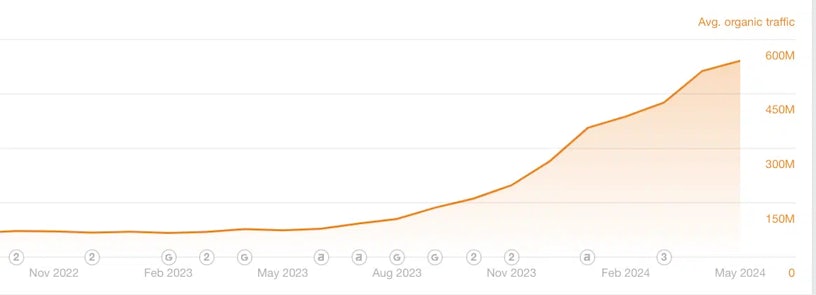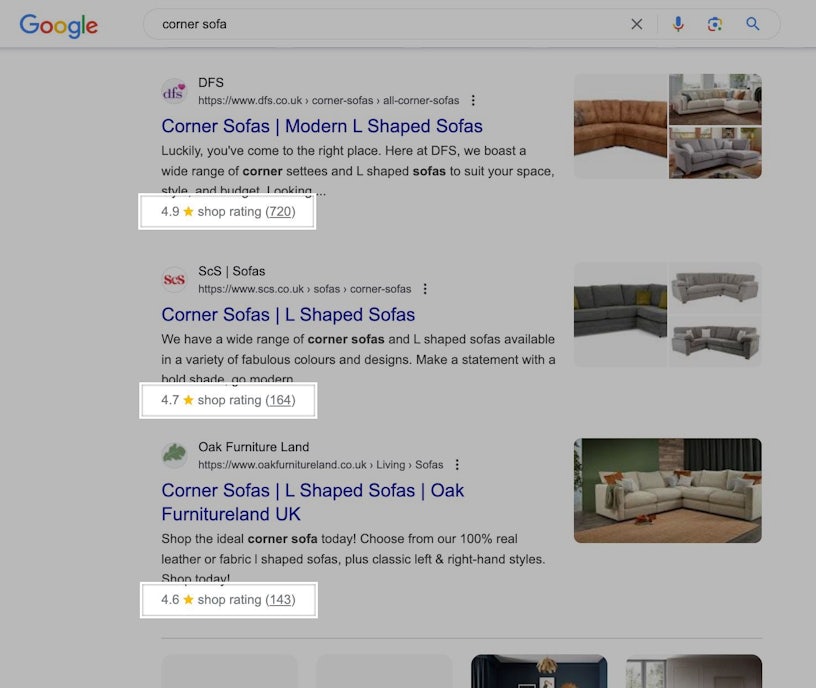This month we bring you some exciting developments and updates from the world of search including new features, the rollout of another Spam update and tips and advice on how to navigate the recent partnership between Reddit and Google.
Firstly, Google rolled out its June Spam update which took just a week to rollout and concluded on the 27th of June. Despite its purpose of reducing spam, many SEOs and website owners have reacted negatively, with many highlighting that low-quality, spammy content continues to dominate the SERPs.
As we see Reddit continue to dominate the SERPs across many industries, Search Engine Land published an insightful article where they advised brands on the best course of action for protecting their online reputation from Reddit.
Other exciting developments include Seller Ratings which is now being tested outside the US in both Australia and the UK and also the return of the classic paginated bar as Google retires its continuous scroll.
We’ll delve into these developments and more in detail in our article below.
Allow our traffic light system to guide you to the articles that need your attention, so watch out for Red light updates as they’re major changes that will need you to take action, whereas amber updates may make you think and are definitely worth knowing but aren’t urgent. And finally, green light updates which are great for your SEO and site knowledge but are less significant than others
Keen to know more about any of these changes and what they mean for your SEO? Get in touch or visit our SEO agency page to find out how we can help.
In this post, we’ll explore:
- Google case study shows the importance of structured data
- CDNs and expired URLs can cause indexing issues
- The importance of structured data
- The power of combining indexing and structured data for visibility
- Reddit: Your new online reputation challenge
- What’s the challenge for brands?
- How should brands react?
- The rising influence of Reddit cannot be ignored
- Google is testing Seller Ratings for organic listings outside of the US
- What do seller ratings look like?
- How can I get the Seller Ratings feature?
- What does Google base ratings on?
- How can I see if I have a seller rating?
- Google on how it manages disclosure of search incidents
- Google dropping continuous scroll in search results
- Google June 2024 Spam Update takes target
In June, Google released a case study demonstrating the significant impact of structured data, schema markup and optimised URLs on search traffic. The study focused on video structured data and highlighted how an Indonesian publisher, Vidio, utilised it to bring in more search traffic. The study provided insights relevant to various content types other than just video and information on how they were close to doubling clicks from the SERPs.
CDNs and expired URLs can cause indexing issues
One key point the study highlighted was that Content Delivery Networks (CDNs) often use expiring URLs for video and image files, which complicates Google’s ability to index these resources.
In their documentation, Google highlighted the importance of using stable URLs for each video, recommending the use of a single, unique, and stable URL per video for better discoverability, consistent indexing and performance tracking. In their documentation, they state:
“Some CDNs use quickly expiring URLs for video and thumbnail files. These URLs may prevent Google from successfully indexing your videos or fetching the video files. This also makes it harder for Google to understand users’ interest in your videos over time.
Use a single unique and stable URL for each video. This allows Google to discover and process the videos consistently, confirm they are still available and collect correct signals on the videos.”
The importance of structured data
Another thing that was highlighted was the importance of using structured data. In this example, it was explained that Vidio utilised VideoObject markup to enhance their video content’s visibility in search results.
As a result of implementing this structured data, Vidio saw an increase of ~3x video impressions and close to 2x video clicks on Google Search.
To ensure accurate structured data was used, Vidio used Google’s Schema Markup Validator and the Search Console video indexing report and performance report. This helped them to identify and fix issues across their entire platform.
The power of combining indexing and structured data for visibility
The final thing that was highlighted by the case study was the importance of ensuring Google can crawl URLs and that structured data is used when qualifying content is present on a webpage. The combination of these two factors ensures that webpages can be indexed properly and they have the best chance of capturing enhanced featured snippets, further improving visibility.
In an article published by Search Engine Land, they took a closer look at the recent partnerships between Reddit and AI firms like Google and OpenAI and what that means for brands. With Reddit’s increasing visibility and its integration into AI platforms, the article stresses how brands must adapt their strategies to maintain and enhance their online reputation.
Reddit’s popularity and organic visibility have surged since early 2022, significantly affecting search engine rankings, and seeing lots of websites outranked by the forum platform. However, with their recent collaboration with OpenAI, along with Google, Reddit has become evermore integral in the search landscape, providing high-quality content for training AI models such as ChatGPT.

What’s the challenge for brands?
The worry comes as AI tools, using Reddit data, might reproduce specific text passages, which can in some cases impact branded searches which can affect brand reputation.
How should brands react?
The article suggests that brands should utilise Reddit where they can. They recommend building and maintaining a branded Reddit profile which can be linked to a website, and other social media to establish legitimacy.
By engaging authentically this allows brands to build a presence by adding value to conversations. One suggestion for how this could be done is by sharing helpful tips and ensuring the brand is mentioned in appropriate contexts to gain upvotes and build trust.
The rising influence of Reddit cannot be ignored
With the recent partnerships between Reddit and AI platforms driving significant changes in the digital landscape, it is clear that brands also need to adapt and evolve to maintain and manage their reputation online.
The article ends by stressing the importance of brands leveraging these platforms to their advantage, by following best practices and monitoring the impact of these changes.
A recent LinkedIn post from Brodie Clark reported that Google is testing Seller Ratings for organic listings outside of the US for the first time. This feature is now being tested in areas such as Australia and the UK and it hopes to be a useful tool for eCommerce sites that wish to improve click-through rates and build trust with prospective customers.

What do seller ratings look like?
Seller ratings will appear under each search result on the search engine results page (SERP). It will be a rating out of 5 and will show the number of reviews you have received as well as a link to read recent reviews and a highlight from your reviews e.g. average delivery time.

How can I get the Seller Ratings feature?
To be eligible for the Seller Ratings features you must ensure you have an appropriate product review system (either through Google Customer Reviews or through a supported review partner such as TrustPilot or Reviews.io) and product reviews marked up.
What does Google base ratings on?
Google bases seller ratings on three different factors including Google Customer Reviews Shopping reviews for your domain and aggregated performance metrics from Google-led shopping research.
How can I see if I have a seller rating?
To check whether you have a seller rating you can use the following URL:
https://www.google.com/shopping/ratings/account/lookup?q={yourwebsite}
You can read more about Google’s seller ratings in their official documentation.
In Google’s podcast ‘Search Off The Record’ Gary Illyes and John Mueller discussed how incidents can impact indexing and crawling, and when the search engine decides to publically declare that an incident has occurred.
Gary Illyes emphasised that in most cases, Google Search is not experiencing issues. Rather, the reported problems are often caused by network routing issues on the Internet, not from Google’s infrastructure.
In the podcast, it was explained that a Site Reliability Engineering (SRE) team is responsible for ensuring that public-facing systems like Ads, Gmail, and YouTube run smoothly. There are automated systems in place that will send a warning to the team when an incident or issue is triggered. The team will then do further investigation to assess whether the issue requires further attention.
As an example of how Google monitors and responds to incidents, Gary Illyes highlighted the February 2024 indexing problem. In this case, an incident was triggered internally and, after further investigation, it was escalated to a medium priority, prompting a public announcement.
While this indexing problem was made public, not all problems are announced. Instead, it is only those that significantly impact users that are typically disclosed. As part of this, the search engine also considers the extent to which the issue is impacting the user experience. For instance, if an issue affects users but doesn’t prevent them from finding what they are searching for, a public statement may not be necessary, as users can still access the information they need.
Google has stopped using continuous scrolling in the search results and has reverted to using paginated results.
The search engine claims that the reason for this decision is to speed up the serving of results, though not everyone is sure that Google’s intentions are this altruistic. Some argue that this shift benefits sites on the first page by increasing their clicks, which could lead to more ad clicks and visits to Google properties like AI Overviews – ultimately just making Google more money. There is even speculation that this might be the beginning of organic search results being pushed entirely to the second page, potentially on a completely new domain.
However, not everyone views this change as being negative. Some commentators highlighted that continuous scrolling harmed websites and provided a poor user experience as it encouraged mindless scrolling. However, introducing paginated results promotes more purposeful searching, potentially enhancing interaction with websites by filtering traffic to those interested in what is on offer.
Regardless of whether you think removing his feature will improve user experience, one thing is almost certain: the visibility for sites not on the first page will be reduced.
Following a particularly turbulent period that was experienced at the end of May and into June, on 20th June Google announced that it was rolling out the June 2024 Spam Update. The update which aimed to improve the quality of search results took a week to complete, with Google’s Search Status Dashboard showing the update as finishing on 27th June.
As with the March 2024 Spam Update, this is Google’s attempt to tackle sites that violate its spam policies and improve search results and the user experience. It is important to note that this update does not address those sites engaging in reputational abuse.
The June 2024 Spam Update aims to tackle:
- Sites that automatically generate content with the sole intention of manipulating search results
- Websites that buy or sell links to manipulate rankings
- Poor-quality content
- Deceptive techniques and instances of black hat SEO
The reaction to this update was largely negative, with many SEOs expressing frustration over Google’s repeated claims of tackling spam while irrelevant or low-quality results continue to dominate the search results. However, the June 2024 Spam Update is expected to further refine Google’s spam detection capabilities, which may result in ranking volatility in the coming weeks.








